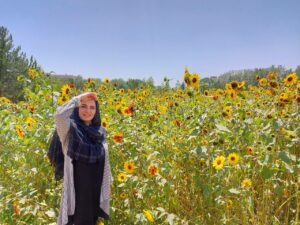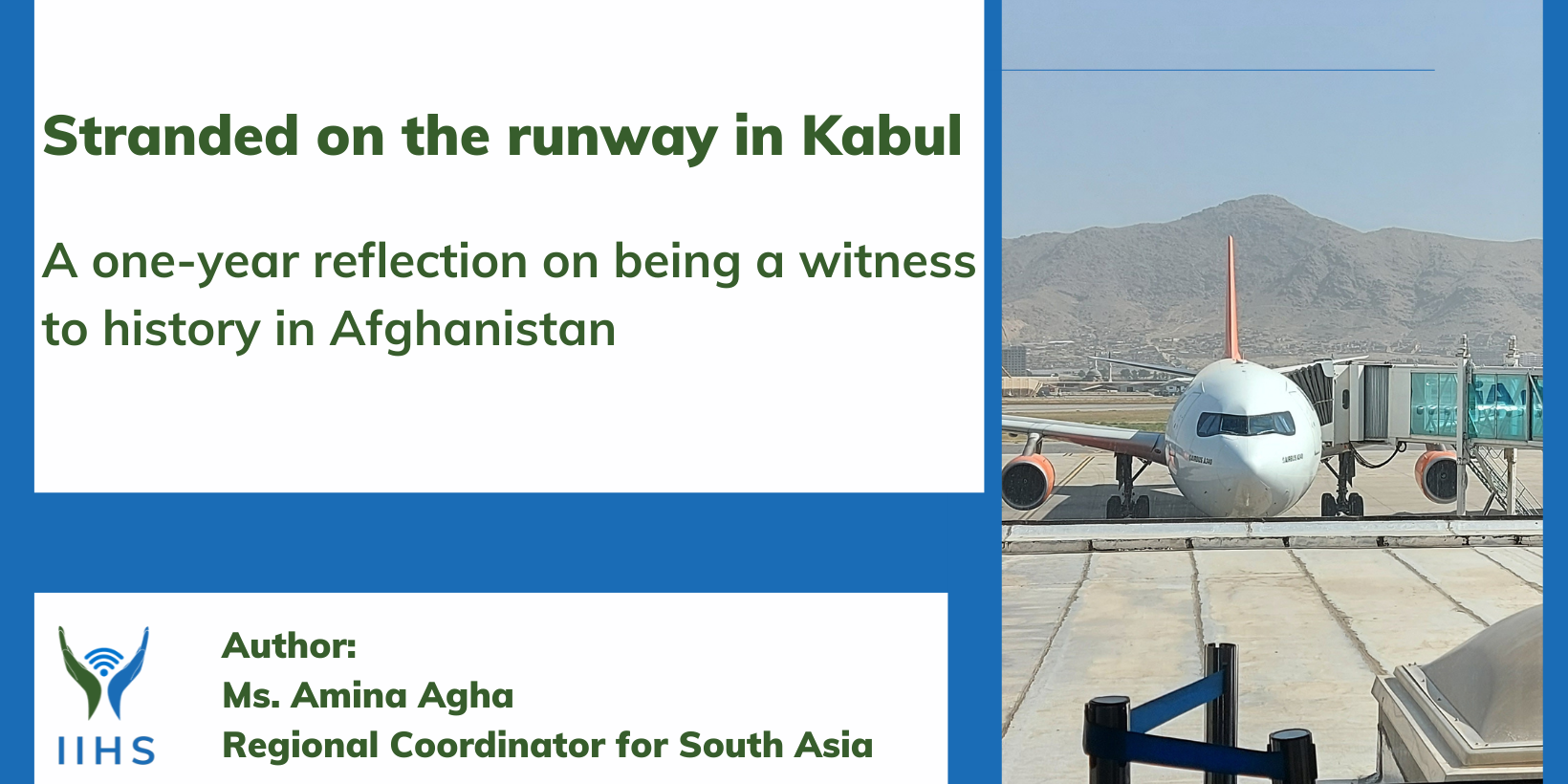Stranded on the runway in Kabul
A one-year reflection on being a witness to history in Afghanistan
Part 1
August 15 marked that fateful day I evacuated from Afghanistan after the Taliban took over Kabul- quietly, unobtrusively, as if someone left the door open at night. Before that, things unraveled at lightning speed, leaving me, like many others, almost gasping for air, scrambling to find ways to reach our native countries.
I left for the airport with my flat-mate Ravi very early morning- 6 hours before our flights- because the recent influx of people from other provinces in Kabul had led to unbelievable traffic on the roads. Moving at a snail’s pace to the airport wasn’t a very comforting thought. I pictured how my colleagues would be waking up, getting ready to go to work, and how when the girl at the reception- whom I had grown so fond of- would feel when she found out I had left for Pakistan. In the frenzied hours before my departure, I did not get a chance to say goodbye to anyone.
We reached the airport and waited for the check-in counter to open. It was business as usual. The airport was busy, but that was expected, given the situation. Having an uncanny ability to pass an enormous amount of time without getting irritated or bored, I patiently waited for the flight to open. Ravi, whose flight to Dehli was scheduled an hour before mine, was busy talking to his wife and chatting with a little girl sitting next to him. My brother back home consistently inquired about my whereabouts and worried for my safety. It did not comfort him that I was inside the airport, although it relieved him to some extent. At long last, the counter opened, and I was one of the first ones in line. When the guy handed me the boarding pass, I thought it was over, all the stress and uncertainty that preceded that moment and the day before that, when all flights were booked, and when it felt I would be stuck there indefinitely. It was early morning in Pakistan too, and it was only when I got the boarding pass and sat in the lounge that my brother hit the bed.
It was like any other day in the lounge. Ravi kept chatting endlessly, and since I am not a morning person, it took all the courtesy I had in my cells to respond to the banter. We had breakfast. I sent pictures of the omelet to my family, so they could relax that I am fine and I am safe. Ravi’s flight was on time, and our goodbyes were bittersweet. He had been one of the most supportive people at work and had been working in Afghanistan for the past few years. Without him, I wouldn’t have learned to love this country in the short span of time that I was there. When he left, I wondered if I will ever be back in the country I loved so much.
And then it struck me- all the grief that I had been hoarding inside for my colleagues and Afghan people in general, hundreds of men, women and children in Shahr-e-Naw Park, who had travelled from provinces to take shelter in Kabul. Right before I got in the car, I spent some time talking to one of our drivers. I can never forget his weary eyes, forcing a smile but unable to hide the immense sadness that lurked there. The driver told me how unaffordable the visa and ticket to Pakistan is now, on the rare chance that you are granted one. And then said, “I cannot get out of here with my family; I don’t know what lies ahead. I can only hope. ‘Allah malik hai.’” The phrase means God will take care of it. It is a form of “Tawakkul”, which essentially means reliance on God’s eternal wisdom and trusting in his plan. But at that moment, there was not only trust, but resignation to God’s will as well. My heart broke to pieces.
I took a picture of the plane and posted it on social media. With a lump in my throat, I sat there, motionless- drowning in grief that I had so effortlessly hidden from the world. I felt helpless for the young girls at work, who were terrified at the prospect of not being able to work or go out independently. I felt I betrayed all of them, like a fair-weather friend. I take pride in working for the humanitarian sector, and I felt I failed everyone in Afghanistan when I booked the flight back home. My only consolation was in the fact that what I was doing could be done in a secure environment as well; atleast, for the time being.
In this brief window in time, where I was in Kabul, and saw beautiful women, all dressed-up in salons, aspiring, talented young girls at work and the entrepreneurs exhibiting exotic handmade jewellery and crafts, girl scouts gleefully tossing pancakes at weekly breakfasts, sunflower fields, strikingly noticeable in the backdrop of arid mountains, lush grapevines and fruit trees, all seemed to turn into a dream in a matter of a few hours. And the worst was yet to come. Boarding was announced. And I realized that for the past more than an hour, I had no awareness of what was going on around me. Not only that, I was sitting in the wrong lounge. I hurriedly made my way through the crowd and stood in an endlessly long line of passengers.
When I boarded, no one could foretell that things would fall apart so soon so rapidly. What seemed like a routine delay in take-off with the national carrier turned out to be a traumatic nerve-wracking episode. Minutes turned into hours on the runway. The crew gave everyone mixed messages, such as that they were waiting for luggage, waiting for passengers, and facing operational delays. The truth was, we did not have permission to fly. My flight was going to take off at 11:45 am. Around 1 o’clock, I received news from friends and family that the Taliban had entered Kabul. Not knowing any further details, it was then that panic set in. Anything could happen if we were not given the clearance to fly. The fact that the Afghan government delegation was also on-board fed the fears of passengers, who at that moment were expecting anything to happen, from the plane being hijacked to us being held as human shields. It is human nature to think of the worst in such ambiguous situations. A friend of mine told me that commercial flights are being halted and that US military evacuations are being given priority.
Ravi had landed in Delhi, and I was still on the runway in Kabul.
Stranded on the airport for around four and a half hours served as a stark reminder of the fragility of life and how everyone has the same wishes, prayers, and hopes when faced with the brutal reality of death. Going through life, we seem to think that it is always someone else who is dying or suffering, and when you face a situation where you realize that today it might be you, you realize that in the end, we just want the same thing, to connect with people we love- our families and friends. In that slice of time, we all shared a common concern- our safety.
{Expected publish date of Part II: August 31, 2022}
About the writer
Ms. Amina Agha has around 15 years of experience working for the private sector and for humanitarian assistance programmes in emergencies and disasters in Pakistan and Afghanistan. She has worked with the Government of Pakistan on joint initiatives with UNICEF and UNFPA on gender-and child-centred DRR initiatives. Her core experience is around communications, policy and programme development, and implementation for vulnerable groups. In Afghanistan, she was working as Advocacy and Communication Manager, leading ACBAR’s advocacy priorities amongst key stakeholders, including national and international fora, and the wider humanitarian community. She has worked pro bono as Regional Coordinator for South Asia with IIHS since 2021.

About the IIHS
The IIHS is a convener, collaborator, and advocate for six areas of human security: good governance, food security, climate protection, the Responsibility to Protect indigenous rights, women, migrants, and modern-day slavery as tools to meet the UN 2030 Sustainable Development Goals (SDGs).







